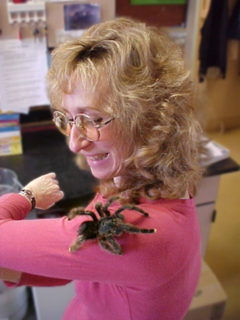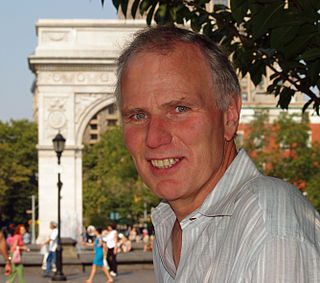A Quote by Richard Preston
Life on the planet is being homogenized by the expanding human population and the frequent and rapid movement of people and goods, which carry invasive organisms with them. These invasives often flourish in their new ecosystems because, like the woolly adelgid, they have escaped their predators.
Related Quotes
The early Triassic was a period when the planet was recovering from the worst mass extinction it had ever known - that was the end Permian extinction, where climate change caused in part by mega-volcanic eruptions wiped out ninety-five percent of life on Earth. It took about ten or twenty million years for the planet's ecosystems to stabilize. During that time you saw a lot of weird, out-of-balance ecosystems where, for example, crocodile-like predators ripped the crap out of each other along the coasts.
We should not be living in human communities that enclose tiny preserved ecosystems within them. Human communities should be maintained in small population enclaves within linked wilderness ecosystems. No human community should be larger than 20,000 people and separated from other communities by wilderness areas. Communication systems can link the communities.
Human relationships with predators have always been thorny. Predators are the first creatures our kind purposely eradicates. Too often, people feel humans are and should be in control; we are enraged to discover this is not true. And when other creatures share our appetites and kill our livestock (often animals we were raising to kill, ourselves), we call them vandals and murderers...Predators are the most persecuted creatures on Earth.
We're shaking loose viruses and dislodging them from their natural ecological limitations, places where they aren't very abundant and have competition, even within a single animal. We introduce them into a new, rich habitat called the human population, where they can flourish more abundantly and cause more trouble.
The colours of insects and many smaller animals contribute to conceal them from the larger ones which prey upon them. Caterpillars which feed on leaves are generally green; and earth-worms the colour of the earth which they inhabit; butter-flies, which frequent flowers, are coloured like them; small birds which frequent hedges have greenish backs like the leaves, and light-coloured bellies like the sky, and are hence less visible to the hawk who passes under them or over them.
If the life-supporting ecosystems of the planet are to survive for future generations, the consumer society will have to dramatically curtail its use of resources - partly by shifting to high-quality, low-input durable goods and partly by seeking fulfillment through leisure, human relationships, and other nonmaterial avenues. We in the consumer society will have to live a technologically sophisticated version of the life-style currently practiced lower on the economic ladder.
We are the only major developed nation that isn't investing meaningfully in high-speed rail, and I believe we're making a mistake. Transportation systems that are fast and efficient and environmentally clean are going to enable the formation of these new mega-regions, the heart of the spatial fix. We need to be able to accelerate the movement of people, goods, and services - the very movement of ideas, knowledge, and creativity - between our major population centers. We have to build these links.
The problem with the United States is that it is making an increased use of drones/Predators [which are] particularly prominently used now in relation to Pakistan and Afghanistan...My concern is that drones/Predators are being operated in a framework which may well violate international humanitarian law and international human rights law.
As for climate change, it's by now widely accepted by the scientific community that we have entered a new geological era, the Anthropocene, in which the Earth's climate is being radically modified by human action, creating a very different planet, one that may not be able to sustain organized human life in anything like a form we would want to tolerate.
Four elements, Hydrogen, carbon, oxygen and nitrogen, also provide an example of the astonishing togetherness of our universe. They make up the "organic" molecules that constitute living organisms on a planet, and the nuclei of these same elements interact to generate the light of its star. Then the organisms on the planet come to depend wholly on that starlight, as they must if life is to persist. So it is that all life on the Earth runs on sunlight. [Referring to photosynthesis]
It was these same families [Rothschild, Rockefeller, Harriman, Bush, etc] who funded the eugenics movement which is pledged to remove the lower genetic blood streams and leave only those of superior stock. Eugenics today often goes under the title of 'population control'. The best known of the population control organizations is Planned Parenthood which began life under another name at the London offices of the British Eugenics Society.
We have reached a new milestone as a human family. With seven billion of us now inhabiting our planet, it is time to ask some fundamental questions. How can we provide a dignified life for ourselves and future generations while preserving and protecting the global commons - the atmosphere, the oceans and the ecosystems that support us?






































